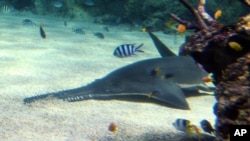New research has shown that Australia is the “last stronghold on Earth” for four out of five threatened species of sawfish. With their serrated snouts, these predatory fish are one of the ocean’s most unusual and endangered animals.
They have a snout, or rostrum, that looks like a hedge-trimmer or a chainsaw. Small electromagnetic sensors help the sawfish detect the heartbeat and movement of buried prey. They are generally unassuming creatures, but when threatened, the saw also serves as a weapon. They can grow up to 7 meters in length and move easily between fresh and salt water. In Australia, they’re found in Queensland, the Northern Territory and on the west coast.
Around the world, they are hunted for their fins and other body parts, which are used in traditional medicines or sold as souvenirs. Habitat loss is a significant threat. So is entanglement in fishing nets as their serrated snout is easily caught up in the mesh.
An international study published in the journal Science Advances, including research from Charles Darwin University in Australia’s Northern Territory, has found that sawfish are now extinct in more than 50 nations.
Leonardo Guida is a shark scientist from the Australian Marine Conservation Society. He says sawfish have disappeared in many parts of the world.
“Sawfish are facing the very real threat of global extinction because of overfishing and habitat destruction across the world,” he said. “So we know that in more than half of the countries that they live in, they are no longer found. That equates to about 55 out of 90 countries, and Australia is the lifeboat. It is the last place on Earth where we have chance to really save these species from global extinction.”
New research has identified eight nations, including Tanzania, Brazil and Sri Lanka, where urgent action could help to save this unique species.
Trade in sawfish is banned under the Convention on International Trade in Endangered Species of Wild Fauna and Flora, but deliberate and accidental killings still take place.




